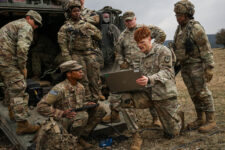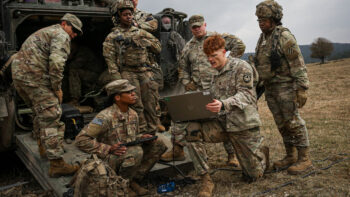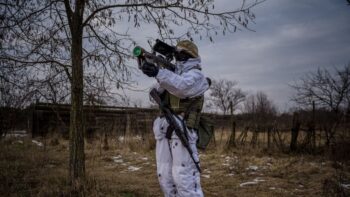 WASHINGTON: While the American war in Iraq may be winding down, things inside the Pentagon are heating up as the department looks to address the increased flow of Iranian weapons finding their way into the hands of anti-U.S. forces.
WASHINGTON: While the American war in Iraq may be winding down, things inside the Pentagon are heating up as the department looks to address the increased flow of Iranian weapons finding their way into the hands of anti-U.S. forces.
The Pentagon’s top weapons buyer Ashton Carter said today that his office is working a number of options to push new technology and equipment into Iraq.
Carter remained mum on the specifics of the Pentagon’s plans during his speech in Washington today, but did note that work was already underway to bolster protective measures on the Caiman model of the Mine Resistant Ambush Protected Vehicle, or MRAP.
The vehicle’s heavily armored design and durability has saved the lives of hundreds of U.S. troops from improvised explosive devices, but has proven susceptible to an armor-piercing variant of the bomb built by Iran known as an Explosively Formed Penetrator, or EFP.
The MRAP modification kits, he said, will reinforce specific points — particularly on the vulnerable underbelly of the vehicle — on the Caiman to be able to withstand a direct blast from an EFP, as well as other IEDs.
DoD has already ordered over 8,000 upgrade kits for the 6,800 Caiman MRAPs in Iraq, Pentagon spokeswoman Cheryl Irwin said. Installation of the counter-EFP kits is ongoing at various locations in Iraq, as well as the main sustainment facility in Kuwait, Irwin added.
The effort led by Carter’s office indicates a growing level of concern within the military over Tehran’s rising influence in Iraq by supplying arms to Shiite militias in Iraq.
The recent resurgence of Iranian arms in country has caused particular concern among U.S. military leaders, since all American troops in Iraq are set to leave the country by December.
Iranian ordinance first appeared in the hands of Shiite insurgency groups during some of the bloodiest days of the Iraq war in 2005 and 2006. Then commander of U.S. forces in Iraq Gen. David Petraeus alleged that members of Iran’s Quods Force, an elite unit of Iran’s Islamic Revolutionary Guard Corps, were responsible for exporting the deadly armaments.
UPDATED
Sullivan says Ukraine supplemental should cover all of 2024, long-range ATACMS now in Ukraine
“We now have a significant number of ATACMS coming off their production line and entering US stocks,” Jake Sullivan said today. “And as a result, we can move forward with providing the ATACMS while also sustaining the readiness of the US armed forces.”


























